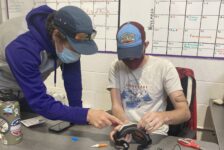
Westminster students wrote about how they had been affected by suicide on notecards. Suicide is the second leading cause of death among college students across the nation. Photos by Callie Jungemann
Tuition payments due, books to buy, assignments piling up, the pressure of getting good grades, maintaining important relationships and trying to balance life on top of it all. College can be an incredible time for a lot of people, but it can also bring upon a lot of added stress to students’ lives. So much so that it can cost their lives.
With the semester getting underway, students can familiarize themselves with resources available on campus that will provide them help, support and information on how to shed the stigma associated with suicide and mental health.
Statistics
In 2015, Utah ranked third in the nation for most suicide death rates, according to the American Foundation for Suicide Prevention. Suicide is the sixth leading cause of death overall in Utah. It is estimated to be the second leading cause of death among college students. An estimated 15 percent of students suffer from depression and other mental disorders that put them at risk for suicide. Each year, 10 percent of students report that they have seriously considered suicide.
Personal Experiences

Freshman Kara Kornhauser opened up about her depression and about losing a fellow swimming teammate to suicide when she was in high school. She said it’s important for students at Westminster to know that there is a safe place they can go if they need help.
Students at Westminster shared their stories of how they have personally been affected by suicide.
Erin Kibler, junior, lost a dorm resident on her floor at Westminster last year. Although she did not know this person personally, she said that it really affected her friends who were roommates with the student.
“No one is perfect,” Kibler said. “Everyone is able to put on masks really well. I think a lot of people think, ‘I’m the only one that struggles with this and everyone else has their stuff together.’ But everyone deals with different things. You should never be embarrassed to say that you’re struggling with something.”
Kibler said that it is important to spread the message about ending the stigma associated with suicide across campus.
“Knowing that there is a safe space for people to go is really important,” Kibler said.
Kara Kornhauser, first-year student, lost one of her fellow swimming teammates to suicide.
“I just remember hearing and being in disbelief because no one ever thought that he would be that type of person, and he didn’t seem sad at all,” Kornhauser said. “The people close to him were really shocked because he didn’t talk to anybody, which was unfortunate.”
Kornhauser said she wants to tell people about her own experience and let them know that depression is “not necessarily a permanent thing.”
Kornhauser said she has diagnosed depression and anxiety.
“I’m open about it, but I could see why people wouldn’t be,” she said. She said there is a stigma with mental illness, as well. “People don’t think of it the same way as physical illness, even though in my opinion they should because it affects people really severely.”
Westminster’s Role and Resources

Junior Erin Kibler lost a fellow dorm resident during her sophomore year of college. Kibler said that she thinks many students who are suffering with depression don’t reach out for help because of the stigma associated with mental health issues.
Westminster provides resources for students in need of help or support such as the Counseling Center. Located in the lower level of Shaw, the Counseling Center works with students on a multitude of issues and concerns, including anxiety, depression, roommate issues, alcohol and drugs, relationship issues, academic stresses and the like.
When discussing suicide prevention, counselor Cory Shipp said that, in any program, prevention is going to be built on connection.
“At Westminster, we rely on teachers, roommates, friends, colleagues and anyone else connected with a person to let us know when they are concerned about a friend or associate,” Shipp said.
He said there should be an ongoing effort to develop a sense of connection with others in the Westminster community.
The Counseling Center not only provides help to those who may be considering suicide but also to individuals and groups who have been impacted by suicide. This support can be in the form of meeting individually with those impacted or in meeting with groups.
Shipp said that when a concern is raised, a Threat Assessment and Behavior Intervention Committee (TABIC) meeting is held.
“This group looks at the concern and helps determine the best way to support the student,” Shipp said. “If someone is considered at risk, then there will be an outreach (in-person visit) done by a member of residence, the Dean’s Office and/or Counseling Center.”
Intermediate safety is the highest priority for the Counseling Center. Counselors also look to support students in finding long-term solutions to their current crisis.
“This may be helping the student access services beyond what the Counseling Center can provide,” Shipp said.
Lisa Jones, director of the Counseling Center, recently sent out an email to students informing them of the Wellness Support Group. The email said this group is, “a safe, supportive and nonjudgmental place, where participants can give and receive support. This group will offer strategies and skills for coping with anxiety, depression, transition and other difficult life issues.”
“We need to be more willing to let others know that ‘I’m not okay’ so that we are not feeling all alone. We always feel like, ‘Oh, no one else would understand, or nobody else is going through this’ when there are actually a handful of other people who can relate.” — Taryn Aiken, American Foundation for Suicide Prevention-Utah chair
The group will be held Fridays from 10 a.m. to 11:30 a.m. There is no cost to attend.
The Counseling Center’s page on Westminster’s website also offers information about ULifeline, where students can learn more about mental health issues and warning signs, access emergency information, etc. It also provides a link to an anonymous self-assessment on depression, anxiety and alcoholism.
Counseling is confidential and provided at no charge. Appointments may be scheduled in person, by telephone or email.
Westminster’s resident advisors (RAs) are another resource, especially for students living on campus.
Ata Siulua, coordinator for Residence Life, said that Westminster trains RAs to focus on the residents on their floor as a whole and also on the ones they don’t see as often.
When it comes to preparing for instances such as suicide, RAs go through a training called Behind Closed Doors. This training puts the RAs in different scenarios, which include suicide, alcohol, Title IX, etc. The faculty and staff who train are also experienced and help RAs realize what possible scenarios are likely and what to do if they occur.
“Suicide is one [scenario] that we definitely focus on,” Siulua said. “Suicide, in my eyes, is like the carbon monoxide of mental health. It’s a silent killer. A lot of people don’t show signs of self-harm until it actually happens.”
Siulua said RAs are always striving to improve because mental health is such a big issue in the realm of higher education. He suggests that one of the best ways to prevent suicide on campus is to build a community with each other.
“If students feel like they have a place on campus, they’re less likely to self-harm if they know they have support,” Siulua said.
Shedding the Stigma

Emily Bushman, a grad student at Westminster, lost a friend to suicide. Utah has the third-highest suicide rates in the nation.
Shedding the stigma associated with suicide and mental health may not happen overnight. However, there are ways it can be accomplished.
“It is important to shed the stigma so that lives can be saved,” said Taryn Aiken, American Foundation for Suicide Prevention-Utah chair. “College is a place for learning anyway, so why not implement even more classes or programs where we can talk about mental health?”
Talking openly about such topics and being nonjudgmental are ways in which the stigma can begin to shed.
“We need to be more willing to let others know that ‘I’m not okay’ so that we are not feeling all alone,” Aiken said. “We always feel like, ‘Oh, no one else would understand, or nobody else is going through this’ when there are actually a handful of other people who can relate.”
Furthermore, Aiken said people need to talk openly and share their struggles and successes so that everyone can grow together.
“Connection between human beings will do that,” Aiken said. “We need to feel valued, heard and seen.”
- National Suicide Prevention Lifeline: 1- 800-273-TALK (8255)
- Westminster Counseling Center: 801-832-2237
- University of Utah Neuropsychiatric Institute (UNI): 801-587-3000
- Salt Lake Behavioral Health: 801-264-6000
Author’s Note
I personally experienced suicide through the loss of my younger brother, Matt, back in 2013. Losing my only sibling and best friend is without a doubt the worst thing that has ever happened to me. He was the last person you would ever think would take his own life, but it happened. I want to help others and let them know that they can reach out and find help and support, whether that is through me or the school or anywhere else. I know it is easier said than done, but there are people who understand and who will want to help in any way they can.
Shedding the stigma on suicide and mental health is not something that will happen overnight or even by next week, just like people won’t suddenly stop feeling sad. These things are complicated and challenging, but are not impossible to accomplish. Ignoring the fact that suicide is an issue and not talking about the stigmas associated with it will not make it go away. We cannot just act like it’s not happening. It’s reality.
Lastly, going through college is like learning how to walk. You’ll stumble, trip and fall, but you can always get back up, whether you do it on your own or have someone there to help you. Struggling is natural, especially during this time in your life. It’s okay not to feel okay. It’s okay to tell someone that you are struggling and need help. It takes courage and there is no shame in any of that. Just remember, if you get to your lowest of lows, think about how far you’ve already come in life and what you’ve accomplished. Be proud of yourself. Stay strong. Don’t give up.










survivor of an attempted suicide
Don’t give up, don’t ever… don’t ever give up.